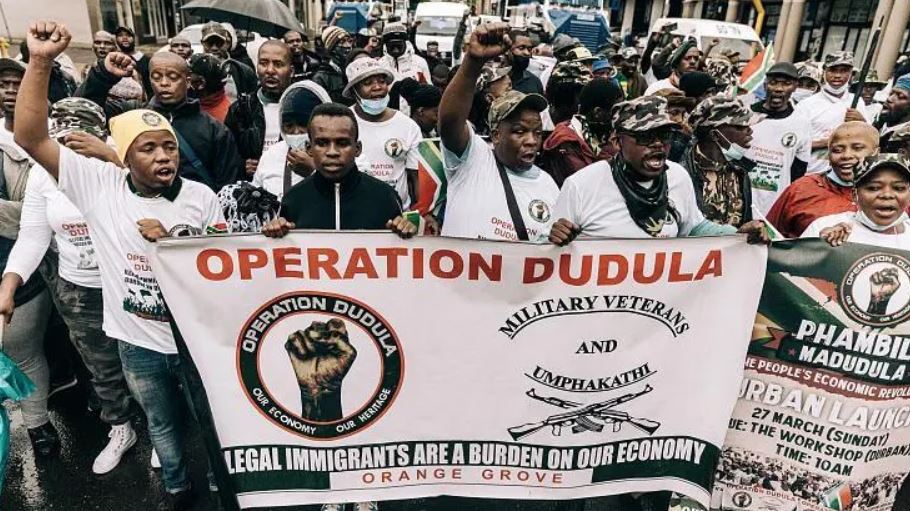A Nigerian market trader was early this year targeted by members of a South African anti-migrants group known as Operation Dudula. The raiders including two women grabbed the Nigerian man, destroyed his clothes and threw them in the gutter.
As they shot he says they swore at him, saying: “You must go to Nigeria… We are Dudula, we are South African.”
With no stock, he is now sleeping on the streets: “I vote in this country. I am a citizen here. I’ve never seen a country treating people like this. If I’m doing something illegal, fine. Deport me. But I’m not doing anything illegal. Now you make my life miserable, I can’t pay my rent. I want to go, it’s too much.”
Operation Dudula was set-up in Soweto two years ago, the first group to formalise what had been sporadic waves of xenophobia-fuelled vigilante attacks in South Africa that date back to shortly after white-minority rule ended in 1994.
It calls itself a civic movement, running on an anti-migrant platform, with the word “dudula” meaning “to force out” in Zulu.
South African anti-migrant group Operation Dudula has become notorious for raiding businesses belonging to foreign nationals and forcing shops to close.
Dimakatso Makoena a 57-year-old single parent of three a resident east of Johannesburg says, “To tell you the truth, I hate foreigners. How I wish they could just pack and go and leave our country.”
The South African Social Attitudes Survey for 2021 found that almost half of the population of 60 million people believed there were between 17 and 40 million immigrants in the country.
However, According to a 2022 report by the Institute for Security Studies (ISS), an independent research organisation based in the capital, Pretoria, there are about 3.95 million migrants in South Africa, making up 6.5% of the population, a figure in line with international norms.
This number includes all immigrants, irrespective of legal status or where they come from.
The xenophobic rhetoric used by some public officials, politicians and anti-migrant groups has helped fuel the myth that the country is overrun with migrants.
Zandile Dabula, who was voted in as president of Operation Dudula in June 2023 claims, “foreigners” are the root cause of South Africa’s economic hardship. We must be realistic here that most of the problems that we have are caused by the influx of foreign nationals.”
“Our country is a mess. Foreign nationals are working on a 20-year plan of taking over South Africa,” says Zandile Dabula.
“You see drugs everywhere and most of the drug addicts are South African rather than foreign nationals. So, what’s happening? Are they feeding our own brothers and sisters so that it can be easy for them to take over?” Zandile Dabula says.
However, comparative statistics are not available for drug crimes, though the ISS report quotes the justice minister as saying that immigrants made up 8.5% of all convicted cases in 2019 and 7.1% in 2020. The ISS adds that 2.3% of inmates incarcerated each year are undocumented foreigners.
Mandla Lenkosi noted, “We grew up in apartheid times, where things were much better than what it is now,” he says, pointing to the drug problems. “The law was the law [then].”
“Our fathers started the tuck shops but today all those tuck shops are all foreigners, especially, Bangladeshis, Somali and Ethiopians. Why?”
Annie Michaels, an activist from the Johannesburg Migrants Advisory Panel, says South Africans are blaming the wrong people for their ills and should in fact admire migrants for their survival skills.
“Stop sitting and complaining and dying in that corner and waiting for the government that is failing you on a daily basis,” she says.
“The migrants… are the poorest of the poor. They would rather go to them and rattle them, instead of rattling the cages of the guys living in the glass houses.”
For her part, Ms Dabula says critics of Operation Dudula who maintain it is a collective of violent vigilantes are wrong.
“We don’t promote violence and we don’t want people to feel harassed,” but adds: “We cannot be overtaken by foreign nationals and do nothing about it.”




















